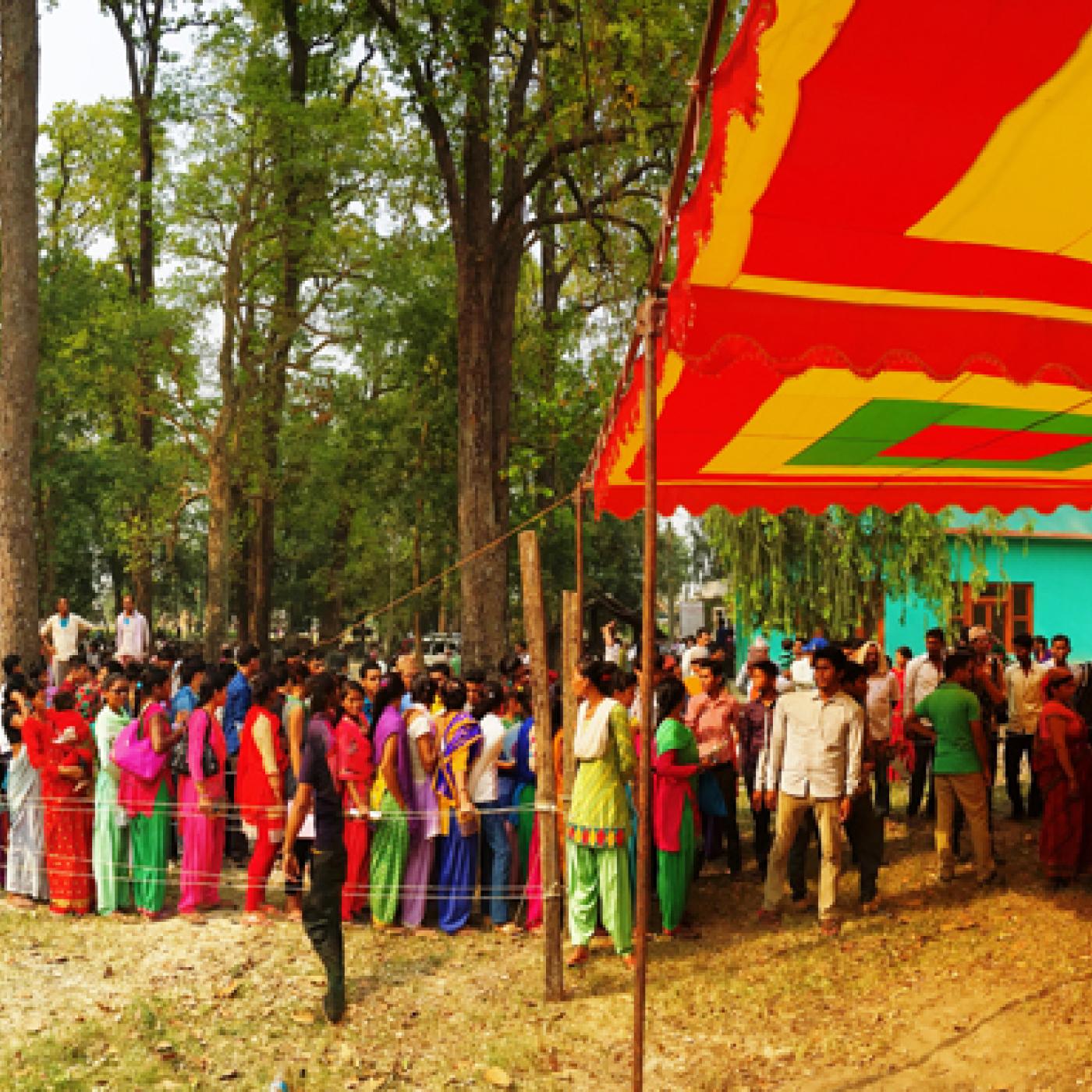Tools & Resources
Filter by
Type
Publication date
Language
Type
Publication date
Language
News & Updates
Feature
Nepal Holds Phase One of First Local Elections in 20 Years
On May 14, 2017, Nepal held phase one of the first local elections in 20 years. More than 14 million voters across 75 districts were registered to elect 34,908 local-level legislative and executive representatives over two phases – the second phase of the election is scheduled for June 14.
News & Updates
Feature
Why an Intersectional Approach to Gender Quotas is a Must: An Example from Nepal
IFES recently conducted a Violence Against Women in Elections (VAWIE) Assessment in Nepal to analyze the potential challenges that create and exacerbate incidents of violence against women in elections, including the local-level elections in May and June. Intersectionality surfaced during discussions about the status of women, and its challenges surfaced in discussions on gender quotas.
Election FAQ
Elections in Nepal: 2017 Local Elections
On May 14 and June 14, 2017, Nepali voters will go to the polls to elect their local representatives, with citizens from different provinces voting on different days.
News & Updates
Feature
Celebrating IFES’ 30th Anniversary in Sri Lanka and Nepal
On January 27, IFES held an anniversary reception in Kathmandu, Nepal, where Sweeney welcomed current and former members of the Election Commission of Nepal, civil society, and representatives of the donor community. IFES has worked in Nepal since 1999, a period that included the 2006 end to a decade-long civil war, groundbreaking Constituent Assembly elections in 2008 and 2013, and the establishment of a new constitution in 2015.
News & Updates
Press Release
IFES Announces Winners of 2016 Photography Contest
Two compelling photographs depicting insightful moments of Election Day in India and voter registration in Nepal have won the top prizes of the International Foundation for Electoral Systems’ (IFES) 2016 Photography Contest. They were part of 10 photographs selected as finalists among the more than 100 images that were submitted to the democracy-themed competition.
News & Updates
Feature
Photo Gallery: IFES 2016 Photography Contest Winner and Finalists
An image of a person with a disability in India on his way to vote with the assistance of his son was selected as the Grand Prize winner in the International Foundation for Electoral Systems’ (IFES) 2016 Photography Contest. A photo of eager citizens in queue to obtain their citizenship cards and enroll on the Election Commission of Nepal's voter register at a mobile camp in Kailali district, Nepal was selected as the IFES Choice winner of the Photography Contest.
Publication
Brochure/Fact Sheet
Factsheet on Electoral Provisions in Nepal’s New Constitution
On September 20, 2015, Nepal’s Constituent Assembly approved a new constitution, transitioning Nepal to a Federal Democratic Republic divided into seven provinces. IFES has developed a factsheet to provide an overview of how the new constitution will affect Nepal’s electoral process, including explanations of the electoral systems to be used for different elected bodies and positions, provisions to ensure representation of women and other marginalized groups, and guidelines on the delimitation of electoral constituencies.
February 18, 2016
News & Updates
Feature
Promoting Gender Inclusion with Nepal’s Election Commission
In the last decade, Nepal has made significant progress in promoting gender equality and women’s political participation, including adopting women’s rights-focused international and national instruments as well as a gender quota in the 2007 interim Constitution.
News & Updates
Feature
Registering Marginalized Populations to Vote in Nepal
As Nepal undergoes critical electoral and governance changes, IFES Nepal is working with local partners to register Nepalis – including Dalits, youth, Muslim women, freed Kamaiya (those subjected to forced labor) and other historically marginalized groups – to vote. This is part of IFES Nepal’s efforts to ensure that all Nepalis are able to participate actively in Nepal’s evolving political process.
News & Updates
Feature
Improving Access to Citizenship Certificates
As a primary legal document in Nepal, the citizenship certificate is compulsory for banking; accessing formal education and employment; registering on the voter’s roll; and obtaining a variety of benefits, including social security and government allowances for people with disabilities, victims of armed conflict and internally displaced persons. Yet despite its importance, there are significant barriers – including lack of knowledge or supporting documents and issues related to gender, caste and extreme poverty – that hinder access to citizenship certificates, especially for those from Nepal’s more marginalized groups.









